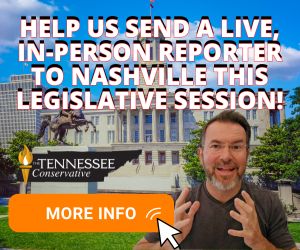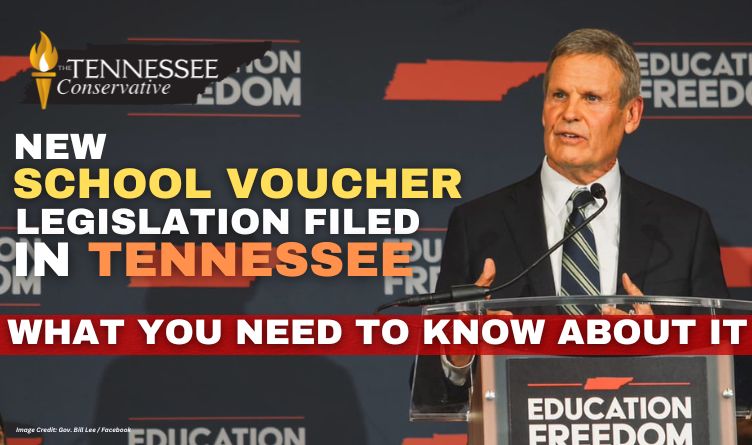Image Credit: Gov. Bill Lee / Facebook
The Tennessee Conservative [By Adelia Kirchner] –
School vouchers are back for another round in Tennessee’s state legislature and there are some notable differences between what state lawmakers will be considering in 2025 and what was proposed during the 2024 legislative session.
Earlier this year, school choice became a real-time consideration for state lawmakers as two drastically different school voucher bills made their way through the House and Senate respectively.
In the end, Tennesseans saw a 17-page Senate Bill which focused solely on Governor Bill Lee’s (R-TN) vision for school choice and a 37-page House Bill also known as “The House Public School Omnibus Bill” which maintained a large focus on “positive things” meant to “transform” the public education system.
This included an overhaul of TCAP testing requirements, moving the state’s Achievement School District (ASD) under the Department of Education (DOE), shutting down the ASD in 2026, new plans for teacher and principal evaluations, and authorizing state-funded health care for public and charter schoolteachers.
Another difference between the two versions was that the House bill ultimately specified school voucher funding would be for the attendance of private schools and charter schools only.
The Senate bill, on the other hand, prided itself on the funds being used for students to attend public schools, private schools, charter schools and homeschool.
This new version of school voucher legislation is the same in both chambers of the legislature and was filed on Wednesday by Tennessee Majority Leaders Sen. Jack Johnson (R-Franklin-District 27) and Rep. William Lamberth (R-Portland-District 44).
HB0001/SB0001 or the “Education Freedom Act of 2025” acknowledges some of the concerns that were raised about the 2024 attempt at bringing school choice to the state but there are still several sections worth taking a closer look at.

Disbursement & Eligibility
Similar to the previous school choice proposal, 20,000 “scholarships” or “vouchers” would be available to eligible students for the first applicable school year, which in this case would be 2025-2026.
The first 10,000 scholarships would be given to students who meet the eligibility requirements of Tennessee’s Education Savings Account pilot program or the Individualized Education Act as outlined in TCA 49-6-2602 and 49-10-1402 and/or students whose annual household income does not exceed 300% of the amount required for the student to qualify for free or reduced lunches (i.e. students whose annual household income does not exceed $173,000 annually for a family of four).
Then the idea is that the remaining 10,000 scholarships would be awarded to eligible students regardless of whether the student meets either of the above criteria, making the second half of these scholarships “universal.”
Now, there is still a bit of a caveat to this order of distribution.
Should the number of applications received be greater than the number of available scholarships for that school year, the order of distribution changes and additional income-based requirements are added.
In this case, scholarships would be awarded in the following order:
1. Students who received a school choice scholarship the previous school year.
2. Students whose annual household income does not exceed $57,720 for a family of four or an eligible student as defined in TCA 49-6-2602 or 49-10-1402.
3. Students whose annual household income does not exceed $173,000 annually for a family of four.
4. Students who are enrolled in public school or who are eligible to enroll in kindergarten in a public school that year.
5. Eligible students.
Additionally, starting with the 2026-2027 school year, if the number of applications received is more than 75% of the total number of scholarships available for that year, the number of scholarships “must be increased by an additional 5,000 scholarships” for the following school year.

Allowable Usage of Scholarship Funds
According to this legislation, Education Freedom Act scholarship funds would have to be used to pay the student’s tuition and fees before anything else.
Remaining funds received by the student may be used for other education expenses including:
1. Tuition and fees required by the private school in which the recipient is enrolled
2. Textbooks, curricula, instructional materials, and uniforms required by the private school in which the recipient is enrolled
3. Tutoring services provided by a tutor or tutoring facility that meets the requirements established by the department
4. Fees for transportation to and from the private school in which the recipient is enrolled, paid to a fee-for-service transportation provider that meets the requirements established by the department
5. Computer hardware, technological devices, and other technology fees that meet the requirements established by the department and that are used for the recipient’s educational needs
6. Tuition, fees, textbooks, curricula, and instructional materials for summer academic programs and specialized afterschool academic programs that meet the requirements established by the department. (Excluding afterschool childcare)
7. Fees for early postsecondary opportunity courses or examinations, entrance examinations required for postsecondary admission, and industry credentials as approved by the department
8. Educational therapy services provided by therapists who meet the requirements established by the department
As Gary Humble of Tennessee Stands pointed out in his recent breakdown of HB0001/SB0001, it is important to note that many of these uses are allowable under the condition that they meet “the requirements established by the department.”
This means that HB0001/SB0001 does not, for example, specifically define what summer academic programs or specialized afterschool academic programs these funds can be spent on, the Department of Education does.
These requirements that would affect students receiving the funds as well as the private schools they enroll in may not be established until after this legislation is passed.
Even if they are, these requirements can be altered and added to by the Department of Education without going through the state legislature.
Testing Requirements
Gov. Lee’s initial proposal for school choice did not include any testing requirements. Parent satisfaction was meant to be the main measure of success. However, the House and Senate did end up including testing requirements in the 2024 legislation to appease public school supporters.
This new iteration of school choice still includes testing requirements for students who receive the scholarship funds.
Students in 3rd–11th grade would be required to take two standardized tests annually, even if the student attends a private school that does not require such testing.
This would include one nationally standardized achievement test and the TCAP exam.
One of the biggest concerns that was voiced regarding the testing requirements outlined in the 2024 school choice legislation was that private schools would be subject to follow these testing requirements and begin “teaching to the test” even if they do not typically do so with their student population.
Another concern was brought up regarding the mandated reporting by private schools of scholarship student testing data.
The new legislation dictates that private schools “may” provide the test results required using aggregated, deidentified data.
As Gary Humble pointed out in his own analysis, this use of language means that private schools “may” also provide the state government with a private school student’s fully identified data.
“It doesn’t require the data to be private. A private school ‘may’ also choose to just send all of your child’s data to the state,” he said. “I would think most people would be more comfortable if this word said ‘shall’ not ‘may.’”
Homeschool
Page two of this legislation provides the definition of an “eligible student” for the purposes of this school choice program.
As introduced, HB0001/SB0001 defines an “eligible student” as “a resident of this state who is entitled to attend a public school, except for a student enrolled in a home school, as defined in § 49-6-3050, or in a church-related school, as defined in § 49-50-801, with which the student’s parent is associated, registered, or is participating as a parent-teacher for purposes of § 49-6-3050.”
The specificity of this language seems to alleviate the concern of many Tennessee homeschoolers, by effectively making homeschool students ineligible for these school choice scholarships.
A large concern raised by homeschoolers earlier this year was that accepting education dollars from the state could open the door for unwelcome government regulation, homeschoolers being subject to existing state education requirements and regulations and a potential increase in cost for homeschool resources across the state.
Private Schools
A section of this legislation titled “Autonomy of schools that have recipients enrolled” attempts to address some previous concern regarding the state having an influence or say in how private schools operate and what they teach.
According to the bill text, “The creation of the education freedom scholarship program does not expand the regulatory authority of this state, the officers of this state, or the authority of any LEA to impose any additional rules, regulations, or requirements on private schools that enroll recipients beyond the rules narrowly tailored to enforce the requirements of the program.”
However, this language is open-ended and does not necessarily prevent state interference.
HB0001/SB0001 allows the “rules narrowly tailored to enforce the requirements of the program” to remain in complete control of the Department of Education.
This means that new legislation does not have to be brought in order to alter these rules.
Following the passage of this bill, these rules concerning private school autonomy could simply be altered by the DOE. Rule changes would not have to go through the state legislature.
Special Education
HB0001/SB0001 as introduced states that, “a recipient does not retain the right to receive special education and related services from the LEA in which the recipient resides, through an individualized education program.”
Under this legislation, students enrolled in the school choice program would obtain the same rights to equitable services through an individualized service plan under the Individuals with Disabilities Education Act (IDEA) as all other non-public school students.
Illegal Immigrants
This new legislation does address concerns regarding illegal immigrants and whether students who fit that description will be able to receive school choice funds.
In a section titled, “Denial of scholarship application” the bill states that “the department shall deny the scholarship application of an eligible student who cannot establish the eligible student’s lawful presence in the United States.”
The House’s version of school choice legislation earlier this year did attempt to do this same thing by defining an eligible student as “a United States citizen.”
However, it has yet to be resolved how exactly Tennessee can keep illegal immigrants from participating in the school choice program under federal law.
Public Schools
Although this new iteration of school choice does make its fair share of attempts at addressing the concerns of several groups, some attempts are certainly grander than others.
Namely, the lengths at which this legislation is willing to go in order to get public school advocates on board.
“Beginning with the TISA allocation for the 2025-2026 school year, an LEA’s allocated education funding shall not decrease from one year to the next year due to the disenrollment of students from the LEA,” the bill text reads. “If an LEA’s calculated TISA allocation decreases from the LEA’s TISA allocation for the prior school year, then the department shall allocate additional funds to the LEA in an amount such that the LEA’s TISA allocation for the current year is not less than the prior school year.”
Under this legislation, if an LEA’s (local education agency) enrollment goes down due to scholarship eligible students leaving that public school system in favor of a private school, then the DOE will effectively keep paying that public school for the students that are no longer in attendance.
“Let me translate what that means,” Humble explained. “It means that public schools will not be held accountable. That’s what it means.”
The hope of many right-leaning supporters of school-choice is that such a program would breed more competition between public and private schools, encouraging or forcing public schools to step their game up and provide a better education to students.
Unfortunately, this legislation as introduced, completely cancels out that potential competition by ensuring that public school districts will still make the same amount of money regardless of how many students leave.
“Taxpayers will be paying for students twice,” Humble noted. “What exactly happens to this money?”
In addition to this double payment promise, the bill includes a one-time $2,000 bonus awarded to all public school teachers in the state of Tennessee for the 2024-2025 school year.
Yet another incentive to get public school advocates on board with school choice is outlined in Section 5 of the legislation which rewrites TCA 4-49-104, dictating that 80% of the privilege tax revenue collected on sports wagering within the state would be re-directed to LEAs for the specific purposes of construction and maintenance of public school buildings.
According to the legislation, the state treasurer “shall” consider the following when allocating these funds:
1. Whether the local education agency is located in a county that is designated as an economically distressed or at-risk county by the department of economic and community development
2. The occurrence of any emergency or natural disaster that has resulted in significant damage to an existing public school building or facility
3. Other demonstrated need, as identified by the local education agency
Currently, 80% of the privilege tax revenue collected on sports wagering goes to the Tennessee Education Lottery. Another 15% goes into the state’s general fund to be allocated to local governments for emergency services and infrastructure with the remaining 5% going to the Department of Mental Health and Substance Abuse Services.
Whether this proposal will receive a better public response than its predecessor is yet to be seen, however it is important to remember that this school choice proposal is defined as a state or local public benefit no matter which way you swing it.
At this point, the discourse regarding school choice in Tennessee has gone in so many different directions that some Tennesseans who would like to see a clean universal school choice program are beginning to favor an alternate approach.
In Tennessee, the average amount spent per student in 2023 was $10,507, which is 31% less than the national average.
Some would like to see a sort of tax credit or refund put in place for those whose children are home schooled or private schooled, instead of pouring such a large amount of money into another government program.
The idea here is that people whose children are not utilizing the public school system would be given the tax dollars back that would otherwise be used to put their children through public school.


About the Author: Adelia Kirchner is a Tennessee resident and reporter for the Tennessee Conservative. Currently the host of Subtle Rampage Podcast, she has also worked for the South Dakota State Legislature and interned for Senator Bill Hagerty’s Office in Nashville, Tennessee. You can reach Adelia at adelia@tennesseeconservativenews.com.



4 Responses
Not a fan of vouchers. Government money always leads to regulations for private and home schools. I homeschooled for 26 years and liked it best when the government kept its nose out of our educational business.
Exactly. What is the difference between the old system and the new? Just as much government overreach.
Let’s not let the perfect be the enemy of what conservatives have long regarded as the good. Finally ending the government school trust’s near monopoly on the education of America’s children is the “good”. This can’t be done overnight with perfect legislation. Rather it must be done one step at a time with legislation as good as we can get it as we come back year after year to perfect it even further. It’s a long road ahead, but let’s begin the journey with the first step when the General Assembly meets in January.
What the government funds, it controls. The conservatives DID want it, but it is a different animal now. We see the globalist encroachment upon our lives and MUST RESIST. There is NO “good” in this. All out taxes are funding over $144,000 Million for 20,000 school kids. There are 1 MILLION school kids in Tennessee. When and where does it stop? So far, the government has proven it is a LOUSY overseer of education.